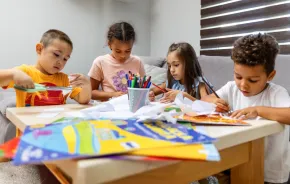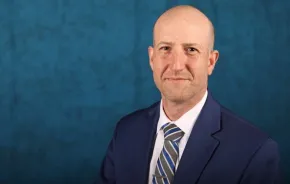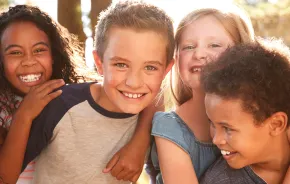
Having a child who has different needs and methods of understanding the world can be complicated. Many parents land in a murky sort of swamp when it comes to balancing different disabilities, neurodivergent behaviors, special education and completely normal childhood struggles.
And while these struggles may vary, what all loving parents want for their outside-the-box kid is a life full of opportunity and possibility. We want to open doors for our children and smash the stigma that has been associated with special needs and differences. In Western Washington, parents and educators are leading the way, setting new expectations and pulverizing old-fashioned misconceptions.
Embracing our weird
One of my personal pet peeves about having a child who is neurodivergent with some learning disabilities is the constant expectation that I would want him to be “normal.” This couldn’t be farther from the truth. I adore my child’s outside-the-box thinking and innovative approach to life. I love that he calls flowers butterflies, that he gives me lines for the “movies” he makes daily and that he can find a loophole to any set of rules.
While of course I hope my child learns how to understand societal behaviors and comport himself accordingly at school, I don’t want him ever thinking his differences are a negative. Normal is overrated, and some of the more influential persons in our country have ADHD just like him. I see his abilities not as a barrier but as an asset later in life.
As a writer, I am able to use my chosen platform for advocacy, promoting awareness of the disability and neurodivergent community from my own experience as well as how my perspective has evolved as I continue to learn and grow. Where my child is not able to use his own voice, I will use mine for him until he’s ready.
These needs aren’t special
Mother and advocate Rachel absolutely hates the term “special needs.” She explains, “All kids have the same needs: the need for caring connection, to know their strengths, to learn how they learn best, and to be physically and emotionally nurtured. It’s just that different kids need different things in order to meet those needs.”
The disability community as shared by The New York Times strongly agrees, noting that avoidance of the term disability and “watering down” the language used to describe people contributes to further stigma. The term “special needs” is also considered offensive by many, as well as “othering.”
This should not, however, be confused with the term special education. While this term may evolve over time, special education refers to specific programs in our Washington state schools that are guided by federal law.
Disability parent and speech-language pathologist Steffani Underhill acknowledges that this language is an adjustment for many.
“This shift away from euphemisms for the word disability was quite surprising to me as I had used the term ‘special needs’ for over a decade,” says Underhill. Most will find — as Underhill and this writer have over time — that these language corrections are simple to implement, however. If language surrounding disability or different conditions is confusing to you, it’s okay to ask and research to find the right words.
As for Rachel, she helps establish just how much accommodations for her child can actually benefit our larger society as a whole. “I look for opportunities to point out how some of the things she considers accommodations are actually good for everyone,” says Rachel. “For example, when [my daughter] uses voice-to-text dictation, I tell her how lots of writers I know use that feature to draft things on the go and how sometimes it’s easier to talk through an idea without having to stop to type. When she watches shows with subtitles, we talk about how those are useful in all kinds of environments.”
Stop judging parenting skills based on meltdowns
If you’re one of those people who’ve looked at a screaming child in a grocery store and judged the parents for having a spoiled “brat,” check your assumptions and start over. First of all, you have no idea why that kid is upset. They could be sick, hurt, sad, hungry or have experienced a recent trauma. For disability kids, these same feelings and sensations can be magnified and more difficult to moderate. And absolutely none of these situations are caused by “bad parenting.”
For parent Rosalind Sage, trying to “blame a parent for not controlling their kid” helps perpetuate harmful myths that:
- “Children are either ‘normal’ [well-behaved/kind/smart] or ‘to be avoided’ [bad/wild/out of control/anxious]’”
- “Children should respond well to any school environment”
Sage further describes that it can seem “... easier for educators and well-meaning family members to look for fault in the parents/parenting or child’s intelligence over identifying and addressing a child’s unique needs, limitations and strengths.”
To smash this stigma and help support issues, Sage and family do the following including “seeking support from experienced professionals: OTs, play therapists and especially those educators who value neurodiversity and make teaching a social and emotional curriculum, along with coaching and offering kids individual feedback, a priority in their classroom.”
What does ‘special’ mean anyway?
Preschool educator Jamie Huizinga doesn’t understand why the emphasis on being normal is such a big deal. Huizinga reflects, “[Special needs] creates this idea that certain people’s needs are ‘special’ and others’ needs are ‘normal.’ There is such a wide spectrum; everyone falls somewhere within it, because everybody has different physical needs, learning styles and emotional needs.”
The educator continues, “The idea that we all must exist on one side of this spectrum to be considered ‘normal’ or to not need or receive support is so frustrating. We don’t look at people going to the gym as ‘special’ — they are working their muscles and bodies — so why do we look at people who work their brains and emotions to better their development of themselves or their child as a ‘special need’?”
Huizinga often works with parents just beginning to understand the needs of their children, as many evaluations on learning and development begin in the preschool years. When parents are trying to find the right support for their children, she shares how she tries to improve expectations: “Coming from the perspective of an educator, I am constantly telling parents ‘your kid is totally normal! It’s just that they learn differently and sometimes the world isn’t always as accommodating to those learning differences.”
A disability is simply one part of a whole child
You will often hear about the disability of children, but not about their awesome abilities. Describes Claudette Rushing, a special education law judge and special education attorney, “... There are often stereotypes about people with disabilities not being ‘smart enough’ for gifted or accelerated courses, but a number of disabilities actually enhance creativity and academic performance.” Adds Rushing, “Many students are ‘twice exceptional’ so qualify as both gifted and eligible for special education or services.”
Other parents avidly agree, noting that needing support or accommodation in one area does not prevent a child from excelling in other areas. For myself, I am constantly inspired by my child’s creative problem-solving. If he doesn’t have the right tool, right character or right setting, he will build, it draw it or create it in some manner. If he doesn’t see barriers to his vision, then why should I?
As for Huizenga, she is inspired by the children she works with and their abilities to perform amazing feats every day. “We call our kids special skills ‘superpowers,’ [for instance] a kid with ADHD or emotional regulation sensitivity has a superpower of recognizing their own emotions and others faster and more intensely than an adult or another child — and that is an amazing power to have!” Providing another example, she shares, “A superpower of being able to maneuver their body even when it feels like a robot is a massive superpower — we work hard to reshape the idea that it is a limitation — it’s a superpower they have that they can do those things!”
Sage notices that her child has extremely keen powers of observation. She describes her child as “... super observant, noticing details missed by adults. Her vocabulary and verbal skills make her SAT-ready and she can memorize and recite a book after it is read to her just a handful of times.”
Rachel also enjoys watching her child excel, sharing, “She can take in a multitude of random, complex information and formulate an in-depth observation that looks at an issue from all sides. She’s incredibly articulate and thinks more critically than many adults I know.”
You can help smash the stigma of “special needs” yourself by educating and engaging with many available resources, such as those shared by the ARC of King County.











